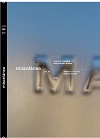9/11 and the Power of the Network Society in Alejandro González Iñárritu’s Babel
DOI:
https://doi.org/10.26754/ojs_misc/mj.20148783Palabras clave:
Sociedad red, 11S, Relaciones de poder, Cosmopolitanismo, Estructura narrativaResumen
En este artículo, propongo un análisis de la crítica de Babel a las desiguales relaciones de poder en la sociedad red global, en particular, tras los atentados del 11-S. Estos acontecimientos precipitaron una nueva política centrada en el Estado, que hizo inevitable y justificó la guerra militar contra el terror, olvidando las preocupaciones cosmopolitas que, en opinión de muchos, habían empezado a florecer a finales de los años noventa, tras la guerra fría. Me baso en la creencia de Manuel Castells de que, aunque una sociedad basada en redes es idealmente una forma de estructura social no centrada, también es una fuente de reorganización dramática de las relaciones de poder. En este sentido, mi análisis sugiere que Babel se desvía de las convenciones narrativas descentralizadas de las películas corales, y que su estructura desigual problematiza las posiciones de dominación y subordinación en la guerra global contra el terror. En concreto, la estructura desviada de Babel se deconstruye como un artefacto paralelo de la crítica temática de la película a las relaciones de poder no cosmopolitas en la sociedad de redes global.
Descargas
Referencias
AZCONA, María del Mar. 2010. The Multi-Protagonist Film. New York: Wiley-Blackwell.
BECK, Ulrich. 2002. “The Cosmopolitan Society and Its Enemies”. Theory, Culture and Society 19 (1-2): 17-44.
BECK, Ulrich and Nathan Sznaider. 2006. “Unpacking Cosmopolitanism for the Social Sciences: a Research Agenda”. The British Journal of Sociology 57 (1): 1-23.
BORDWELL, David. 2006. The Way Hollywood Tells It. Story and Style in Modern Movies. Berkeley: University of California Press.
BUCHANAN, Mark. 2003. Nexus: Small Worlds and the Groundbreaking Theory of Networks. New York: WW Norton & Company.
CALHOUN, Craig J. 2002. “The Class Consciousness of Frequent Travelers: Toward a Critique of Actually Existing Cosmopolitanism”. The South Atlantic Quarterly 101 (4): 869-897.
CASTELLS, Manuel. 2004: “Informationalism, Networks, and the Network Society: A Theoretical Blueprint”. In Castells, M. (ed.) The Network Society: A Cross-Cultural Perspective. Cheltenham, Northampton and Massachusetts: Edward Elgar: 3-45.
—. 2009: Communication Power. New York: Oxford U.P.
COLEMAN, James S. 1998. “Social Capital in the Creation of Human Capital”. American Journal of Sociology. Supplement: Organizations and Institutions: Sociological and Economic Approaches to the Analysis of Social Structure. S95-S120. <http://www.jstor.org/discover/10.2307/2780243?id=3737952&uid=2134&uid=2&ud=70&uid=4&sid=21103176295587>. Accessed December 26, 2013
DELANTY, Gerard. 2009. The Cosmopolitan Imagination: The Renewal of Critical Social Theory. Cambridge: Cambridge U.P.
DELEYTO, Celestino and María del Mar Azcona. 2010. Alejandro González Iñárritu. Chicago, Springfield and Urbana Champaign: University of Illinois Press.
EZRA, Elizabeth and Terry Rowden. 2006. “General Introduction: What is Transnational Cinema?” In Ezra, E. and T. Rowden (eds.) Transnational Cinema: The Film Reader. London and New York: Routledge: 1-13.
KANT, Immanuel. (1970) 1991. “Perpetual Peace”. In Reiss, H. (ed.) Kant: Political Writings. Trans. by H. B. Nisbet. Cambridge U.P.
KERR, Paul. 2010. “Babel’s Network Narrative: Packaging a Globalized Art Cinema”. Transnational Cinemas 1 (1): 37-51.
ROVISCO, Maria and Magdalena Nowicka. (eds.) 2011. The Ashgate Research Companion to Cosmopolitanism. Burlington, VT: Ashgate Publishing, Ltd.
STEVENSON, Nick. 2011. “Cosmopolitan Citizenship”. In Rovisco, M. and M. Nowicka. (eds.): 243-259.
URRY, John. 2007. Mobilities. Cambridge: Polity.
VAN DIJK, Jan. (1999) 2006. The Network Society: Social Aspects of New Media. London, Thousand Oaks and New Delhi: SAGE.
VERTOVEC, Steven and Robin Cohen. 2002. Conceiving Cosmopolitanism: Theory, Context and Practice. Oxford U.P.
WELLMAN, Barry. 1999. Networks in the Global Village: Life in Contemporary Communities. Boulder: Westview.
Descargas
Publicado
Número
Sección
Licencia

Esta obra está bajo una licencia internacional Creative Commons Atribución-NoComercial 4.0.


